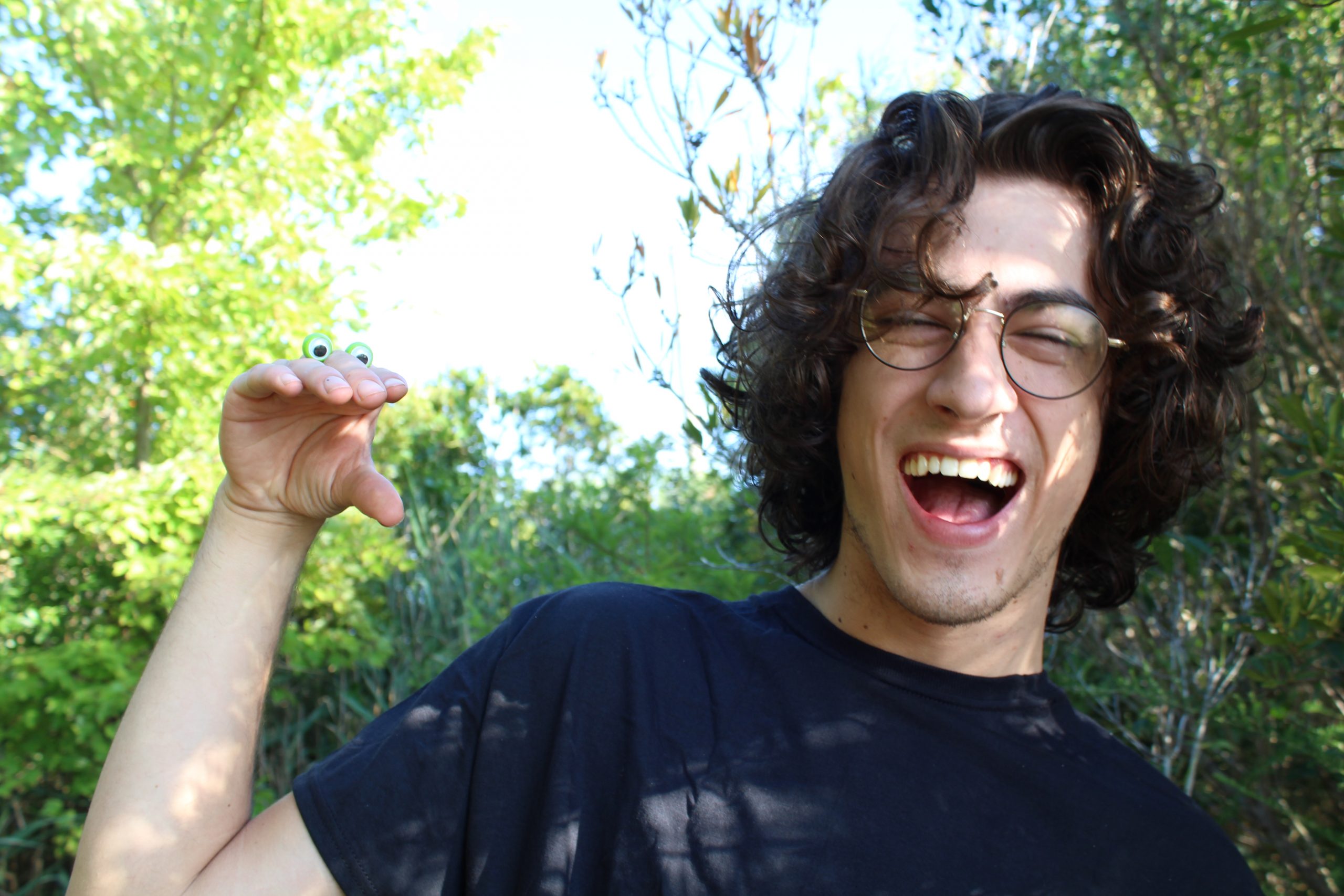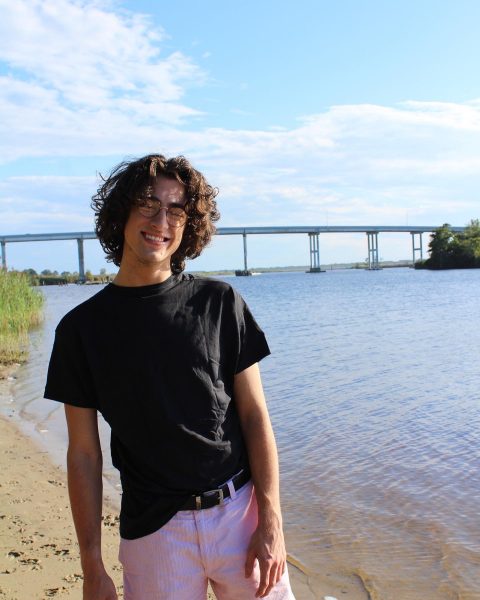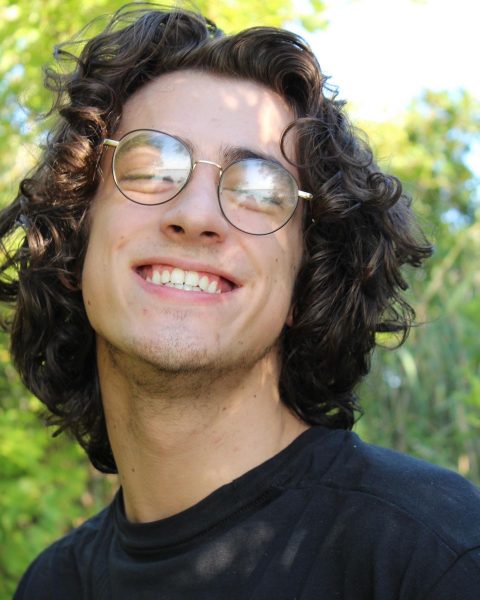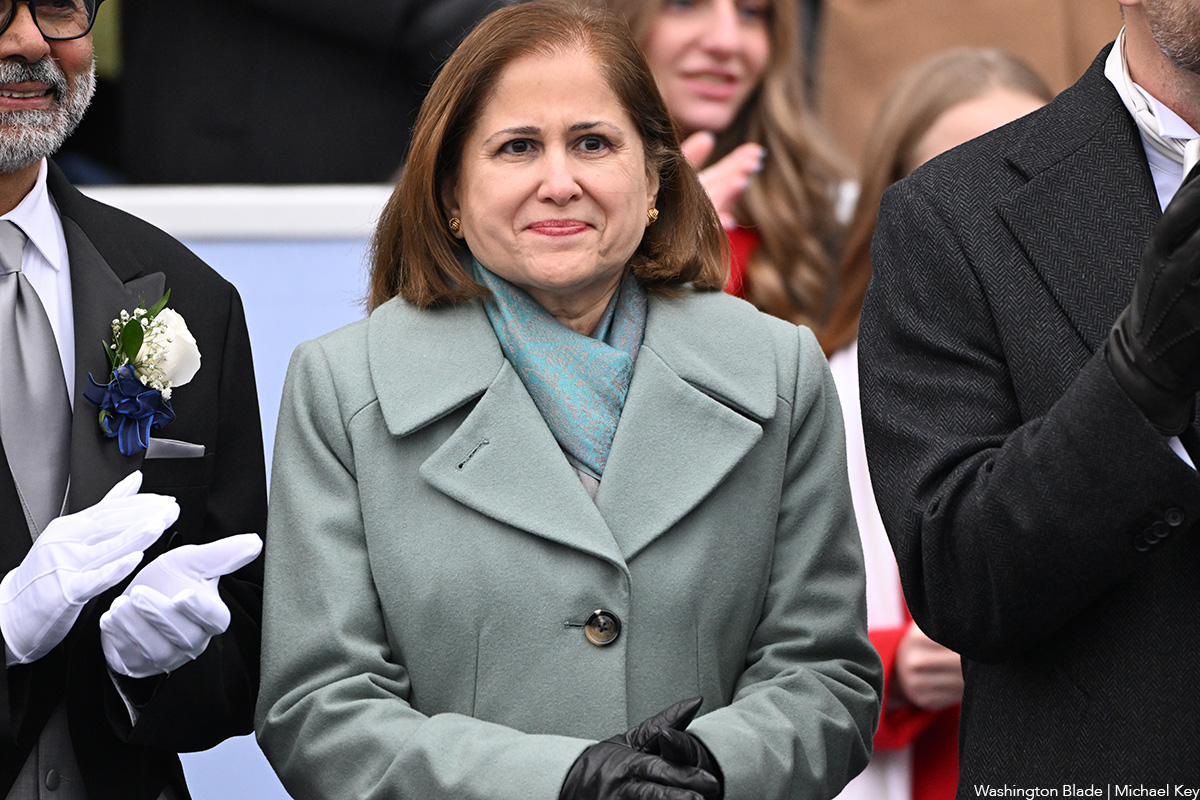Virginia
Gay GenZer wants to be youngest Va. state delegate
Zach Coltrain is running in 98th House district

Zach Coltrain lives in two worlds. In one, he traverses the serene landscapes of Appalachian State University in North Carolina’s Blue Ridge Mountains — studying the use of music as a therapeutic intervention. In the other, he navigates the thorny world of politics in the neighboring state of Virginia, which saw a conservative shift after the election of Republican Gov. Glenn Youngkin in 2021.
Coltrain, a 20-year-old gay Democrat, said those two worlds have coexisted for him since high school — where he split time between the debate team and musicals, campaigning and band practice, politics and music.
“It’s really important to me, solidifying my education with mental health, especially when I let it exist with government, where it appears most people don’t have a strong grasp on how mental health works,” he told the Washington Blade.
The balance will certainly be harder to steer as Coltrain announced his campaign for Virginia’s 98th House of Delegates district in August 2021 — becoming the youngest candidate to run for a seat in Virginia’s lower body. In fact, Coltrain, who grew up in the district, won’t meet the minimum age requirement of 21 until his birthday in September, two months before the election.
Coltrain is joining an ever-growing list of political candidates from Generation Z — defined as those born between 1997 and 2012 — whose older members are just reaching the age where they can legally run for office, 2022 being the first year Gen Z could run in federal elections. And it didn’t take long for Gen Z to get on the board.
On Saturday, Florida Congressman Maxwell Frost, 25, was officially sworn into the U.S. House of Representatives, becoming the first Gen Z congressperson in history.
“The people of Orlando sent me to Washington, D.C., to fight for them and enact the kind of change they want to see in our communities. Gun reform, universal healthcare, housing affordability, tackling the climate crisis and more,” Frost said in a statement. “We have so much work to do, but I’m honored to represent my people.”
In addition, according to campaign finance tracker Open Secrets, Gen Z candidates for federal offices raised millions of dollars during the 2022 campaign season. The nonprofit identified at least seven Gen Z candidates — four Democrats and three Republicans — vying for congressional seats in 2022.
Gen Z is also partially responsible for thwarting the so-called “red wave” that many political analysts predicted for last year’s midterms. In 2022, Democrats overperformed, gaining one seat in the Senate and not losing nearly as many seats in the House as predicted.
Ashley Aylward, a senior researcher at the Washington-based public opinion research firm HIT Strategies, wrote in Time that an “earthquake of young voters shook up the political world” in 2022.
“When young people’s rights are on the ballot and championed by the candidate, they show up,” she wrote.
The numbers seemed to back up her claims. About 1 in 8 voters overall were under 30, according to early exit polling and AP VoteCast, and more than half supported Democratic candidates in the midterm elections. It came during the same year that the U.S. Supreme Court overruled Roe v. Wade, stripping pregnant people of the Constitutional right to an abortion; 74 percent of 18-29-year-olds believe abortion should be legal in all or most cases, according to recent data from the Pew Research Center.
In an interview with the Blade, Aylward couldn’t say definitively whether we could expect a similar turnout of young voters in statewide and local races. Coltrain’s race will be decided later this year — Nov. 7, 2023 — with no headline-grabbing national or gubernatorial elections to help boost turnout.
But Aylward — speaking broadly and making clear she didn’t have enough data to make any clear conclusions — speculated that Dobbs v. Jackson, the case that gave the state’s the power to decide abortion rights, could lead to increased turnout in often overlooked statewide elections.
“I have noticed a shift in attention being turned towards state and local politics, because we know that is where the most impact happens on our day-to-day lives,” she said. “But a lot of it was sparked from the Dobbs v. Jackson case, because people now realize that these decisions about our bodies are going to be made in our state legislatures.”
Aylward added that she hopes to do more research on the topic in the future.
Furthermore, Aylward said she has found that Gen Z voters are “way more motivated to vote when they see young people like them run for office.”
“Most often of what we hear in focus groups is that young people are usually feeling more jaded, because they don’t see people like them in elections, particularly young,” she said.
This begs the question: Can a man not yet able to legally consume alcohol convince the people of Virginia’s 98th House district to vote for him?

In general, Aylward said, she has found that age does matter to some folks. “But most of the time, it boils down to the issues. [Voters] go on and on about the issues that people are championing,” she said.
Coltrain is the only Democrat in the race, clearing his path to the general election. However, his journey to the Virginia House becomes murkier after the primaries. According to the Virginia Public Access Project, Coltrain’s Republican opponent will either be Glenn Davis or Barry Knight — both of whom are current Virginia delegates.
Davis has represented District 84 since 2014, and Knight has represented District 81 since 2010.
The district, which encompasses the southeast corner of the state, did change after redistricting, but it still favors Republicans. The new 98th District is made up of parts of the old 84th, 81st and 21st Districts — all of which favored former President Donald Trump in the 2016 election. In 2021, the 98th District overwhelmingly voted for Youngkin, who captured 63.06 percent of the vote. VPAP categorizes the district as “strong Republican.”
Coltrain admitted that competing in the district worried him, saying there are no guarantees that the district will be flipped. But he believes his campaign is unique and will make him tough competition for his Republican opponent.
Zeroing on Knight, Coltrain criticized the incumbent’s past challengers. “The past few candidates we put up against Barry Knight, my opponent, have been other rich white guys,” he said. “Nobody’s really eating that up.”
“I think that’s not our case, here,” Coltrain added. “I’m a student on a Pell Grant with student aid and a music scholarship, literally barely hanging on financially at points.”
Furthermore, Coltrain touted his campaign issues — which focus on environmental protection, education and healthcare — as a “reflection of both [his] district and also Gen Z in general.”
“I think I found a way to find this niche intersection, where a rural district with farmers in it have the same common interests as Gen Z advocates,” he said. “And I think a big part of that can be the environment.”
As for his opponent using his age against him, Coltrain said, “Honestly, I hope they do.”
“My age is something that I’m going to flip as a good thing, and I have been campaigning with it,” he said. “I started right off the jump telling people that I’m here, and I’m young, and I’m not even old enough to hold the office that I’m running for. I am aware that this is unique, and I’m aware that being the youngest person to run is something that will make people uncomfortable.”
But Coltrain, who has worked on campaigns since he was a teenager, thinks that the “argument that there’s not room for [young people] at the table is not true and won’t be true.”
“I know how to have a real impact in our district,” he said. “I know that specifically, when we’re looking at young activists and organizers, our district is looking for them, tirelessly. I think that this could be a wake up call for us, it can be a way for people my age and people of my generation to realize that this is something that they can do and realize this is the space that they are supposed to exist in.”
Coltrain has no lack of people who believe he could very well be the person to flip the district. In fact, Dr. William “Fergie” Reid, the founder of 90 for 90, an initiative that aims to supply a Democratic challenger in all Republican-controlled districts, reached out to Coltrain directly and encouraged him to run.
Reid — named after his father, William Reid, the first African American elected to the General Assembly in the 20th century — said he was looking for a candidate who was “in college, politically inclined and not scared.” Eventually, he said, “I got his name, and I tracked him down. When I talked to him, he couldn’t have been cooler, and [he] understood what I was talking about.”
In 2021, Republicans swept all three statewide positions — governor, Youngkin, lieutenant governor, Winsome Sears, and attorney general, Jason Miyares — and took control of the House of Delegates in an upset. Youngkin became the first Republican to win a statewide election in Virginia in more than a decade.
Reid said Democrats’ losses in the state were narrow in 2021 and came down to Democrats “not playing hard enough.” To Reid, “if Democrats just play a little bit harder, they’ll take back the majority. And this is what Zach is doing; he’s helping Democrats play just a little bit harder.”
Youngkin has since signed an executive order to root out critical race theory in Virginia’s education system. He has also supported anti-LGBTQ policies, including forcing teachers to out queer students and restricting the rights of transgender students.

Coltrain, who came out as gay when he was 11 years old, said he “was comfortable in telling everybody that I was gay from a really early age.” But “looking at the way things are now, I don’t know that even right now, people could still have that story in the area that I grew up in. And it’s been super, super scary.”
“He’s got the right stuff, and I couldn’t be more proud of him,” he said of Coltrain.
Coltrain is staring down a busy semester, one sure to be full of aching feet and headaches as he’s committed to his campaign, coursework, part-time food truck job and Application State’s debate team, where he is one of two captains.
“It’s a lot for sure,” he said with uncertainty in his voice. “We’re trying to balance it.”
But the brief moment was drowned out by his overwhelming enthusiasm.
“Schoolwork all day and campaigning all afternoon is just normal now,” he said, calling the opportunity “life changing.”
Virginia
McPike wins special election for Va. House of Delegates
Gay Alexandria City Council member becomes 8th LGBTQ member of legislature

Gay Alexandria City Council member Kirk McPike emerged as the decisive winner in a Feb. 10 special election for a seat in the Virginia House of Delegates representing Alexandria.
McPike, a Democrat, received 81.5 percent of the vote in his race against Republican Mason Butler, according to the local publication ALX Now.
He first won election to the Alexandria Council in 2021. He will be filling the House of Delegates seat being vacated by Del. Elizabeth Bennett-Parker (D-Alexandria), who won in another Feb. 10 special election for the Virginia State Senate seat being vacated by gay Sen. Adam Ebbin (D-Alexandria).
Ebbin is resigning from his Senate next week to take a position with Virginia Gov. Abigail Spanberger’s administration.
Upon taking his 5th District seat in the House of Delegate, McPike will become the eighth out LGBTQ member of the Virginia General Assembly. Among those he will be joining is Sen. Danica Roem (D-Manassas), who became the Virginia Legislature’s first transgender member when she won election to the House of Delegates in 2017 before being elected to the Senate in 2023.
“I look forward to continuing to work to address our housing crisis, the challenge of climate change, and the damaging impacts of the Trump administration on the immigrant families, LGBTQ+ Virginians, and federal employees who call Alexandria home,” McPike said in a statement after winning the Democratic nomination for the seat in a special primary held on Jan. 20.
McPike, a longtime LGBTQ rights advocate, has served for the past 13 years as chief of staff for gay U.S. Rep. Mark Takano (D-Calif.) and has remained in that position during his tenure on the Alexandria Council. He said he will resign from that position before taking office in the House of Delegates.
Virginia
Spanberger signs bill that paves way for marriage amendment repeal referendum
Proposal passed in two successive General Assembly sessions

Virginians this year will vote on whether to repeal a state constitutional amendment that defines marriage as between a man and a woman.
Democratic Gov. Abigail Spanberger on Friday signed state Del. Laura Jane Cohen (D-Fairfax County)’s House Bill 612, which finalized the referendum’s language.
The ballot question that voters will consider on Election Day is below:
Question: Should the Constitution of Virginia be amended to: (i) remove the ban on same-sex marriage; (ii) affirm that two adults may marry regardless of sex, gender, or race; and (iii) require all legally valid marriages to be treated equally under the law?
Voters in 2006 approved the Marshall-Newman Amendment.
Same-sex couples have been able to legally marry in Virginia since 2014. Former Gov. Glenn Youngkin, who is a Republican, in 2024 signed a bill that codified marriage equality in state law.
Two successive legislatures must approve a proposed constitutional amendment before it can go to the ballot.
A resolution to repeal the Marshall-Newman Amendment passed in the General Assembly in 2025. Lawmakers once again approved it last month.
“20 years after Virginia added a ban on same-sex marriage to our Constitution, we finally have the chance to right that wrong,” wrote Equality Virginia Executive Director Narissa Rahaman on Friday in a message to her group’s supporters.
Virginians this year will also consider proposed constitutional amendments that would guarantee reproductive rights and restore voting rights to convicted felons who have completed their sentences.

Lieutenant Gov. Ghazala Hashmi on Monday opened Equality Virginia’s annual Lobby Day in Richmond.
The Lobby Day was held at Virginia’s Capitol and was open to the public by RSVP. The annual event is one of the ways that Equality Virginia urges its supporters to get involved. It also offers informational sessions and calls to action through social media.
Hashmi, a former state senator, has been open about her support for the LGBTQ community and other marginalized groups. Her current advisor is Equality Virginia Executive Director Narissa Rahaman, and the group endorsed her for lieutenant governor.
Hashmi historically opposes anti-transgender legislation.
She opposed a 2022 bill that sought to take away opportunities from trans athletes.
One of the focuses of this year’s Lobby Day was protecting LGBTQ students. Another was protecting trans youth’s access to gender-affirming care.
Advocates spent their day in meetings and dialogues with state legislators and lawmakers about legislative priorities and concerns.
-

 Health5 days ago
Health5 days agoCMS moves to expand HIV-positive organ transplants
-

 State Department4 days ago
State Department4 days agoFOIA lawsuit filed against State Department for PEPFAR records
-

 Opinions4 days ago
Opinions4 days agoTrans sports bans rooted in eugenics
-

 New York4 days ago
New York4 days agoPride flag raised at Stonewall after National Park Service took it down




















